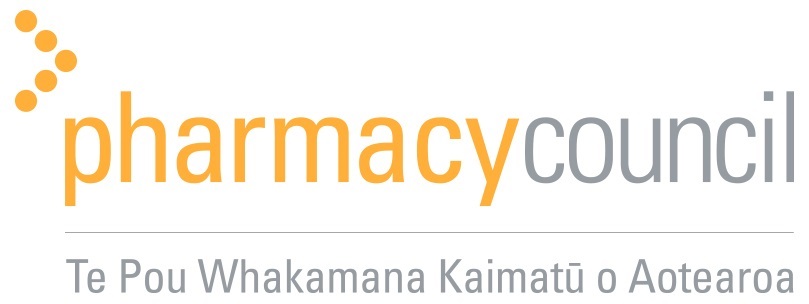
FROM THE COUNCIL CHAIR AND CE
Kia ora koutou,
With chilly temperatures around the country and the regularity of severe weather warnings, we are truly feeling the brunt of winter. We know that this will be a particularly busy and pressured time for pharmacists, with the spike in flu, COVID, RSV and other winter related illnesses ramping up the demand for health services. We appreciate you are at the forefront during this peak time advising consumers about medications, treatment, and accessing other health providers as part of an integrated healthcare approach. We thank you for continuing to uphold professional standards and your commitment to support the health of our communities, despite a challenging health environment.
In this issue of our newsletter, we draw your attention to an article on the supply of pseudoephedrine over the internet and the expectations for pharmacists outlined in our Statement on Telehealth and the Supply of Pharmacy Services over the Internet. We also wish to highlight valuable learning opportunities to support safe practice by publishing summaries of cases from the Health and Disability Commissioner and the Health Practitioners Disciplinary Tribunal.
We trust you find our newsletter informative and as always, welcome your questions and feedback.
Ngā mihi nui
Arthur Bauld (Chair) and Michael Pead (CE)
IMPORTANT FOR YOU TO KNOW
SUPPLY OF PSEUDOEPHEDRINE OVER THE INTERNET
The Pharmacy Council’s Statement on Telehealth and Supply of Pharmacy Services over the Internet sets the expectations for pharmacists involved in providing healthcare and medicines over the internet. It draws on legislation and regulation (which includes competence and professional standards) to set the expectation for a given context of professional activities. Statements go beyond guidelines and are enforceable by Medsafe, the Health and Disability Commissioner, the Pharmacy Council and the Health Practitioners Disciplinary Tribunal.
We were recently approached by a pharmacy group’s representative which was considering supplying pseudoephedrine over the internet. They noted that our statement stipulated ‘Medicines of potential abuse, misuse and dependence (e.g. sedating antihistamines, cyclizine) should not be available for sale via the internet…’ and set out their proposal for limiting the risks from online sale.
We advised that we need independent, comprehensive and widely endorsed proposals to initiate a review of our standards and statements. There is a broad public and professional interest in understanding the implication of changing this expectation, given that there is no current national monitoring scheme. Council does not want regulation to be a barrier for innovative safe practice, however we expect compliance with all regulation. If the regulation is no longer deemed right-touch regulation, in most cases we would expect a proposal setting out the case for change.
For pharmacists in effective control of pharmacies, Medsafe Group Manager Chris James states:
“We encourage pharmacy operators to ensure sales of cold and flu products containing pseudoephedrine (pharmacist only medicines) are made appropriately by pharmacist staff. The pharmacy licensing framework does not preclude the supply by a pharmacy of these products via the internet, however pharmacy operators must not request or require pharmacists to act in a way that is inconsistent with professional and ethical practice standards issued by the Pharmacy Council. Information on the advertising of pharmacist only medicines is available on our website.”
Council have identified at least five pharmacy groups supplying pseudoephedrine via the internet, and we expect that after reminding pharmacists of their obligations, this practice will promptly cease. Our statement has been updated (minor edits only) and includes pseudoephedrine as an example of a medicine of potential abuse, misuse and dependence.
INSIGHTS TO SUPPORT SAFE PRACTICE - HDC DECISION
Failure to inform consumers of serious vaccination side effects
The HDC has found that information about Comirnaty COVID-19 vaccine myocarditis risk was not clearly highlighted or communicated to the consumer. This case provides valuable lessons for pharmacists which we summarise in this article.
Case description
Tragically, a consumer passed away 12 days after receiving the Comirnaty COVID-19 vaccine at a pharmacy in 2021. The consumer was not informed about the symptoms of myocarditis by the vaccinating pharmacist.
During his vaccination, the man was informed of the common, but not the potentially serious side effects of the vaccine. Failing to provide this information was on the face of it a breach of the Code of Health and Disability Services Consumers’ Rights (the Code). The Commissioner determined that an education approach was more appropriate, given significant mitigating factors (e.g., new information about the Comirnaty vaccine’s use, risk and side effects were still forthcoming during this time).
Keeping clinical knowledge up to date
The pharmacist admitted that she was reliant on her employer to provide her with adequate guidance on the processes to be followed and the information to be given to consumers. She was also reliant on official sources of information clearly setting out what information needed to be provided to consumers, and when. The Commissioner also noted that the pharmacy did not update its standard operating procedure to ensure that consumers were given adequate safety netting advice about the myocarditis symptoms to look out for.
The Council agrees with the Commissioner’s view that individual health practitioners are responsible for thinking critically and exercising their clinical judgement about what they need to convey to consumers when providing vaccinations or other medicines. This includes ensuring sufficient information is provided to consumers about the vaccine, both pre-vaccine (as part of informed consent – Rights 6 and 7) and post-vaccine (as part of safety netting advice – Right 6).
If pharmacists are offering immunisation services, they should be familiar with, and abide by any national standards and/or professional guidelines where available. For example, keeping up to date with immunisation programme information COVID-19 Programme – Immunisation Advisory Centre, guidance for health professionals and post-vaccination advice.
We recommend pharmacists, pharmacist managers and/or owners need to review how vital information is shared with their clinical staff who are providing vaccination services. The urgency and importance of new information needs to be made clear (e.g., amended processes, clinical advice, safety netting advice) in a timely manner.
Relevant Standards can be read in Competence Standards for Aotearoa New Zealand Pharmacy Profession
Interprets and integrates information for provision to colleagues, other health professionals, person(s) being cared for and/or the public in a clear, cohesive, and objective manner (Behaviour 3.1.5)
Obtains appropriate consent to administer the medicine (Behaviour 6.4.2)
Provides people with sufficient information to ensure the safe and proper use of medicines, including effective use of devices (Behaviour 5.4.4)
HEALTH PRACTITIONERS DISCIPLINARY TRIBUNAL FINDINGS
The Health Practitioners Disciplinary Tribunal (HPDT) holds disciplinary proceedings against health practitioners, including pharmacists, who are alleged to have breached standards of practice. Decisions involving pharmacists are provided to Council by the HPDT so that we can publish a summary of the case for learning purposes.
Read the summary of a recent HPDT decision that established charges against pharmacist Mohammed Abdel Rahim and the finding of professional misconduct. These charges included falsification of records; making incorrect and/or misleading statements to the Pharmacy Council and to Medicines Control; and failure to securely store controlled drugs.
OUR ENGAGEMENT JOURNEY
COUNCIL AND PROFESSIONAL ASSOCIATIONS
We value our relationships with the professional associations and are committed to being open and transparent, to ensure that the associations are well informed of our strategic priorities and aligned work programme. We are in regular contact with the associations, which includes continuing to host the Council and professional associations online hui throughout the year. A range of topics were covered at our most recent hui in May, including: the new professional standards that came into effect on 1 April this year, the success of this year’s APC renewals, improvements to our overseas application process, and our digital investment to adequately resource IT capability and capacity to protect data.
Council CE Michael Pead said it was a very positive session and Council appreciated the questions and discussion from the associations. “These sessions are also valuable as the professional associations have an integral role supporting their members through advocacy, learning and other areas, and it’s an opportunity to explore how we can work together to make progress on issues such as what support they offer for members to practise to the professional standards and undertake continuing professional development that meets the requirements.”
Council also met recently with the new Pharmaceutical Society of New Zealand President Michael Hammond, and Chief Executive Helen Morgan-Banda. Our Council Chair Arthur Bauld and CE Michael Pead also presented to the Society’s Executive Committee on our strategic priorities and work programme.
FOLLOW US ON LINKEDIN
Council is focused on keeping the profession well informed about our key activities. We have added to our communication channels and joined social media platform Linked In. This is a great avenue to share information on what we are doing, complementing our newsletter and email updates, and to also enable engagement from the profession. Visit our Linked In page and follow us for regular updates.
KEEPING YOU UP TO DATE
MYRECERT SUPPORT FOR PHARMACISTS AND REVIEW
A core part of Council’s recertification is the requirement for pharmacists to undertake continuing professional development, tailored to their individual learning needs, and to record this in MyRecert portfolios.
Council is confident that most pharmacists are achieving a high degree of quality professional development to maintain their competence and fitness to practise. Last year’s review of MyRecert portfolios showed that most pharmacists are meeting the requirements. We provided feedback to pharmacists who needed to make improvements to their portfolios and found that the areas identified most often as needing more work included self-reflection and cultural safety.
To provide stronger understanding of the requirements for MyRecert, Council is launching a series of bi-monthly communications to pharmacists, with the first one focused on ‘getting started/developing SMART goals.’ These will be particularly useful to support newly registered pharmacists on their MyRecert journey, however the communications series is aimed at all pharmacists. Future topics will include cultural safety, critical reflection, peer groups, and the verifier role.
This year’s review of MyRecert portfolios for 2023/24 (i.e. portfolios completed to 31 March 2024 and randomly selected) will soon be underway. Last month Council sent out an Expression of Interest for registered pharmacists with the appropriate skills to apply to become MyRecert reviewers. Council is now shortlisting candidates for these roles.

MID-YEAR ASSESSMENT CENTRE RESULT
A nearly 100 percent pass rate at the mid-year Assessment Centre (AC) was welcomed by Council and the Pharmaceutical Society of New Zealand, with 43 interns eligible to register in the pharmacist scope of practice. Both organisations congratulated interns and commended their hard work. Council CE Michael Pead said that the AC process is rigorous and robust, “and the public can have confidence that those who pass are ready to practise independently and contribute to better health outcomes for New Zealanders.” The Society said it was a much-needed boost to workforce numbers.
COUNCIL TEAM MEMBER PROFILE

Rajwinder (Raj) Kaur, Senior Advisor, Competence Assurance
Raj is Council’s Senior Advisor in the Registration and Competence Assurance team and works across registrations covering complex/out of policy applications, the Assessment Centre, and the development and implementation of Council’s accreditation processes.
Raj joined Council in late 2023, and has broad health sector experience having worked in organisations such as Hawke’s Bay DHB and ACC. She gained extensive knowledge and skills in regulation at the Medical Council of New Zealand (MCNZ) and the Optometrist and Dispensing Board (ODOB). At MCNZ, she began as an Advisor and was later appointed Team Leader for Professional Standards – Competence, which included working on competence and conduct complaints, competence reviews and remediation. She also co-led the facilitation of MCNZ’s New Zealand Registrations Examination for international medical graduates. Raj was the Deputy Registrar at ODOB, expanding her knowledge in registrations, practising certificates, and CPD programmes, along with systems upgrades and transformational projects.
Raj says she enjoys working with such supportive colleagues at Council and looks forward to delving into accreditation, which is a new area for her. Originally from Hawkes Bay, Raj often goes up to visit her family. Outside of work she enjoys spoiling her five-year-old nephew, light reading, and occasionally dabbles in painting.
A PHARMACIST PRESCRIBER'S JOURNEY
Laura Severinsen is based in Hawke’s Bay and shares her journey to develop the competence to become an effective Pharmacist Prescriber working at top of scope, delivering safe, patient-centric care.
 As a Pharmacist Prescriber what does a typical day look like for you?
As a Pharmacist Prescriber what does a typical day look like for you?
Balancing the working life of a mumma (or “mum,” which my 20-month-old daughter has recently decided to call me, much to my disappointment), is a challenge. Fortunately, the workspace of Pharmacist Prescriber, or a Clinical Pharmacist working in Primary Care, helps to alleviate this stress. I work part-time where half my time is working from home where I virtually connect with the practice team. A brief overview of the clinic for the day is posted, and we chat, share resources, and offer support to one another. The other half is spent in clinic, where team connection is nurtured by common interests such as an open mind for hearing alternative perspectives and a passion for improving healthcare for our patients. I lead a weekly collaborative healthcare team meeting to discuss cases, quality improvement strategies and health targets, and processes to improve the efficacy and value of our service.
I primarily identify patients proactively, through repeat prescribing reviews, auditing (e.g., patients with type 2 diabetes and an HbA1c greater than 80 mmol/mol), recalls to Pharmacist Prescriber led long-term conditions clinics and less commonly through reactive referrals from the practice team and wider community. Depending on requirements, I consult with patients by phone and/or face-to-face clinic appointments. Pharmacist Prescriber consultations are directly accessible to patients at our practice and involve long-term management of conditions and medicine reviews. There is a focus on collaboration with patients to understand their perspective on life, health, and condition management. This helps to shift the power to the patient to facilitate shared decision making. I build relationships with patients that are supportive, honest, safe, and genuine. I have patients that only express their health concerns with me because they feel heard and validated. We then work together to move forward with their concern, whether engaging a member of the collaborative healthcare team or navigating the situation together. Patients are comfortable being honest with me without fear of judgement.
I obtain blood pressure readings for patients with white-coat hypertension that are reflective of what they have at home. With trust, there is a flow on effect where other health concerns receive earlier intervention (e.g., a suggestion for future conversations around gout management become immediate interventions at the patient’s request). Ultimately, we advance their health journey to create achievable and realistic goals. Patients are grateful to see and feel their health improve and stabilise. As a Pharmacist Prescriber the delivery of healthcare is efficient. Care plans involve autonomous decision making that can be implemented immediately, while a patient is engaged. As a result, there is less clinical inertia. Being the person responsible for an intervention, means being accountable for follow-up. Patients respond well to booking follow-up appointments in advance; their health feels valued, they have a time frame to commit to changes that they have agreed on and therefore engage with follow-up appointments. Meanwhile, there are resources freed elsewhere in the practice to address other patients’ concerns, increasing accessibility to appropriate healthcare in a timely way.
As a Pharmacist Prescriber there is great satisfaction in prescribing, with the ability to amend systems and improve efficiency. Examples include, ensuring medicine lists and instructions are unambiguous, medicine quantities are dispensable, that only appropriate monitoring is included in laboratory forms, and disease classifications are up to date and clearly defined. While these things can initially be complicated and time consuming, they give dividends in return. I now understand the exceeded capacity of healthcare and have a way to contribute toward safe and efficient patient care for everyone involved (i.e., the practice team, community pharmacy, secondary care services and community referrals).
How have you applied clinical reasoning and experiential knowledge in your practice?
Working as a Clinical Pharmacist in Primary Care I observed a reactive environment working at capacity, unable to meet the increasing demands on the healthcare system. As a Pharmacist Prescriber I’ve been able to help ease the pressure by proactively reviewing patients to minimise disease burden, serve their needs during consultations and work collaboratively to address future health concerns. A shift in perspective has been an unexpected and eye-opening transition. As a Pharmacist I thought I was making decisions with patients in front of me. As a Pharmacist Prescriber, I was invited to understand the true complexity of communication, consultation skills and application of clinical knowledge to the patient sitting with me. This helps to build the bigger picture, e.g., capturing a medical history rather than a medicines history, having accountability for decisions and completing necessary follow-up. Prescribing is more than having clinical knowledge; it’s about listening, applying clinical knowledge and having a discussion with the patient in front of you. The shift in perspective, autonomy and the increase in productivity has been immensely satisfying. I enjoy going to work and working as a team, working with like-minded people and connecting with patients and seeing them thrive.
What’s your advice to other pharmacists who are thinking of becoming a Pharmacist Prescriber?
Be brave to seek a range of opportunities, step outside of your comfort zone and be prepared to show your value. These are characteristics that will help toward being an effective Pharmacist Prescriber. Previous experience within the environment of intended prescribing practice is essential to develop advanced practice. It ensures understanding of how the environment functions, how to navigate it, where to find support and develop networks you need, and understand the limitations and practicality of your decision making related to prescribing. Opportunities are not always obvious or presented as an invitation.
Be curious and be prepared to turn up to meetings you may not be invited to and contribute to show your value. Continuously evolve your patient-centred care by seeking engagement with patients to understand their perspective. Seek mentorship from people with the skills and mind-set that resonate with your vision to grow and develop. Explore beyond your comfort zone of pharmacy by attending multidisciplinary meetings and education sessions to gain a broader understanding of health conditions. Use postgraduate education, such as Hauora Māori, primary care, public health, to expand thought concepts. Get involved with local and regional networks. Build relationships with other professionals with an understanding of what their role is and how it supports your role as a Pharmacist Prescriber. Self-reflection is also a necessary skill to keep you practice safe and effective. It is also vital to recognise your limitations and know when to ask for assistance. Prescribing is more than just signing a piece of paper.

